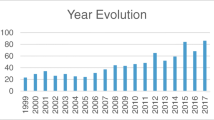Abstract
This article analyses the first 10 years of research published in the Information Systems Frontiers (ISF) from 1999 to 2008. The analysis of the published material includes examining variables such as most productive authors, citation analysis, universities associated with the most publications, geographic diversity, authors’ backgrounds and research methods. The keyword analysis suggests that ISF research has evolved from establishing concepts and domain of information systems (IS), technology and management to contemporary issues such as outsourcing, web services and security. The analysis presented in this paper has identified intellectually significant studies that have contributed to the development and accumulation of intellectual wealth of ISF. The analysis has also identified authors published in other journals whose work largely shaped and guided the researchers published in ISF. This research has implications for researchers, journal editors, and research institutions.


Similar content being viewed by others
Notes
References
Adam, A., & Richardson, H. (2001). Feminist philosophy and Information Systems. Information Systems Frontiers, 3(2), 143–154.
Arrow, K. J. (1999). Team theory and distributed processing: surprise attack. Information Systems Frontiers, 1, 1 11–14.
Arrow, K. J. (2003). Foreword: information dynamics in the networked world. Information Systems Frontiers, 5, 1 5.
Avison, D., Dwivedi, Y. K., Fitzgerald, G., & Powell, P. (2008). The beginnings of a new era: time to reflect on 17 years of the ISJ. Information Systems Journal, 18(1), 5–21.
Barki, H., Rivard, S., & Talbot, J. (1993). A keyword classification scheme for IS research literature: an update. MIS Quarterly, 17(2), 209–225.
Bell, D., de Cesare, S., Iacovelli, N., Lycett, M., & Merico, A. (2007). A framework for deriving semantic web services. Information Systems Frontiers, 9(1), 69–84.
Berg J. E. & Rietz T. A. (2003). Prediction markets as decision support systems. Information Systems Frontiers, 5(1), 79–93.
Bunker, D. (2001). A philosophy of Information Technology and Systems (IT & S) as tools: tool development context, associated skills and the Global Technology Transfer (GTT) process. Information Systems Frontiers, 3(2), 185–197.
Casati F. & Shan M.-C. (2002). Event-based interaction management for composite E-Services in eFlow. Information Systems Frontiers, 4(1), 19–31.
Chen, C. (2004). Searching for intellectual turning points: progressive knowledge domain visualization. Proceedings of the National Academy of Sciences, USA, 101(Suppl.), 5303–5310.
Chen, C. (2006). CiteSpace II: detecting and visualizing emerging trends and transient patterns in scientific literature. Journal of the American Society for Information Science and Technology, 57(3), 359–377.
Chen, W. S., & Hirschheim, R. (2004). A paradigmatic and methodological examination of Information Systems research from 1991 to 2001. Information Systems Journal, 14(3), 197–235.
CiteSpace Wiki. (2008). CiteSpace glossary. https://cluster.cis.drexel.edu:8443/cswiki/index.php/Glossary. Last accessed August 21, 2008.
Clarke, R. (2008). An exploratory study of Information Systems researcher impact. Communications of the Association for Information Systems, 22, 1–32.
Claver, E., Gonzalez, R., & Llopis, J. (2000). An analysis of research in Information Systems (1981–1997). Information & Management, 37, 181–195.
Davis, F. D. (1989). Perceived usefulness, perceived ease of use, and user acceptance of information technology. MIS Quarterly, 13, 319–340.
Davis, G. B. (1999). A research for Information Systems and example of emerging area of research. Information Systems Frontiers, 1(3), 195–203.
Davis, F. D., Bagozzi, R. P., & Warshaw, P. R. (1989). User acceptance of computer technology: a comparison of two theoretical models. Management Science, 35(8), 982–1003.
Dobson, P. J. (2001). The philosophy of critical realism—an opportunity for Information Systems research. Information Systems Frontiers, 3(2), 199–210.
Dwivedi, Y. K., & Kuljis, J. (2008). Profile of IS research published in the European journal of Information Systems. European Journal of Information Systems, 17(6), (forthcoming).
Dwivedi, Y. K., Kiang, M., Lal, B., & Williams, M. D. (2008). Profiling research published in the journal of electronic commerce research. Journal of Electronic Commerce Research, 9(2), 77–91.
Dwivedi, Y. K., Williams, M. D., & Venkatesh, V. (2008a). Guest editorial: a profile of adoption of Information & Communication Technologies (ICT) research in the household context. Information Systems Frontiers, 10(4), 385–390.
Freeman, L. A. (2001). Information Systems knowledge: foundations, definitions and applications. Information Systems Frontiers, 3(2), 249–266.
Gray, P., & Hovav, A. (1999). Using scenarios to understand the frontiers of IS. Information Systems Frontiers, 1(1), 15–24.
Gregg, D. G., Kulkarni, U. R., & Vinze, A. S. (2001). Understanding the philosophical underpinnings of software engineering research in Information Systems. Information Systems Frontiers, 3(2), 169–183.
Klaus, H., Rosemann, M., & Gable, G. (2000). What is a ERP? Information Systems Frontiers, 2(2), 141–162.
Palvia, P., Pinjani, P., & Sibley, E. H. (2007). A profile of Information Systems research published in the information & management. Information & Management, 44, 1–11.
Ramesh, R., & Rao, H. R. (2008). Editorial. Information Systems Frontiers, 10(1), 1–2.
Ross, J. W., & Vitale, M. R. (2000). The ERP revolution: surviving vs. thriving. Information Systems Frontiers, 2(2), 233–241.
Sage, A. P., & Rouse, W. B. (1999). Information Systems Frontiers in knowledge management. Information Systems Frontiers, 1(3), 205–219.
Shaw, M. J. (1999). Electronic commerce: review of critical research issues. Information Systems Frontiers, 1(1), 95–106.
Stohr, E. A., & Zhao, J. L. (2001). Workflow automation: overview and research issues. Information Systems Frontiers, 3(3), 281–296.
Wang Y., Lo H.-P. & Yang Y. (2004). An Integrated Framework for Service Quality, Customer Value, Satisfaction: Evidence from China’s Telecommunication Industry. Information Systems Frontiers, 6(4), 325–340.
Ziegler C.-N. & Lausen G. (2005). Propagation models for trust and distrust in social networks. Information Systems Frontiers, 7(4), 337–358.
Author information
Authors and Affiliations
Corresponding author
Rights and permissions
About this article
Cite this article
Dwivedi, Y.K., Lal, B., Mustafee, N. et al. Profiling a decade of Information Systems Frontiers’ research. Inf Syst Front 11, 87–102 (2009). https://doi.org/10.1007/s10796-008-9147-7
Published:
Issue Date:
DOI: https://doi.org/10.1007/s10796-008-9147-7




